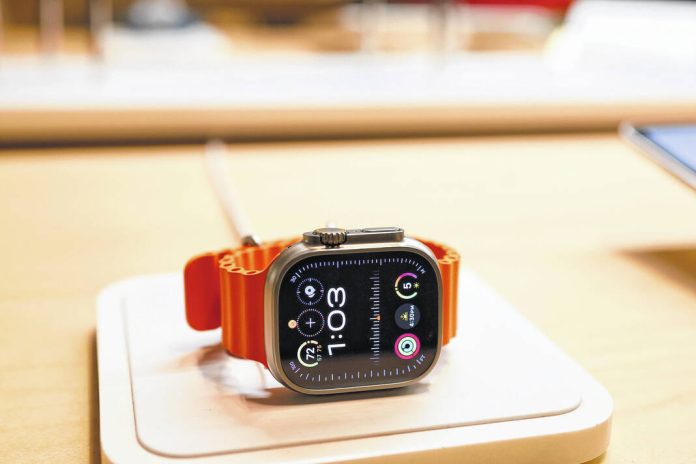Apple Inc., just days away from a U.S. ban of its smartwatches, is plotting a rescue mission for the $17 billion business that includes software fixes and other potential workarounds.
Engineers at the company are racing to make changes to algorithms on the device that measure a user’s blood oxygen level — a feature that Masimo Corp. has argued infringes its patents’ rights. They’re adjusting how the technology determines oxygen saturation and presents the data to customers, according to people familiar with the work.
It’s a high-stakes engineering effort unlike any Apple has undertaken before. Though the iPhone maker’s products have previously been barred in certain countries over legal disputes, this restriction would hit one of Apple’s biggest moneymakers in its home country — on Christmas no less. Without a last-minute veto by the White House, a ban imposed by the International Trade Commission will take effect on Dec. 25.
Apple could settle with Masimo, though that’s a route it typically prefers not to take. And the two companies don’t appear to have engaged on that front. For now, Apple is focused on modifying its technology and trying to win favor with regulators.
If the ban holds, Apple is working on a range of legal and technical options. Already, it’s begun preparing stores for the change. It sent new signs to its retail outlets that promote the Apple Watch without showing photos of the Series 9 and Ultra 2 — two models targeted by the ban. The company’s lower-end SE watch will still be available.
Apple plans to stop selling the prohibited watches on its website on Thursday and then pull them from its roughly 270 brick-and-mortar outlets by Dec. 24.
Work within Apple suggests that the company believes software changes — rather than a more complicated hardware overhaul — will be enough to bring the device back to store shelves. But the patents at the heart of the dispute are mostly related to hardware, including how light is emitted into the skin to measure the amount of oxygen in a person’s blood.
An Apple spokeswoman said the company is working on submitting a workaround to the U.S. customs agency, which is in charge of approving changes to get a product back on the market.
Masimo has said that a software fix will be an insufficient remedy. “The hardware needs to change,” the maker of medical devices said.
The ITC ban will take the form of an import restriction that makes it impossible for Apple to sell the device in the U.S.
While the company is working on both hardware and software fixes, actually getting the new technology to market will take time. Apple’s internal software testing process is lengthy, for good reason. The company needs to ensure that any changes won’t break other smartwatch features. The adjustments also may need additional testing given their medical purpose.
The blood-oxygen feature was first added to the Apple Watch in 2020 with the Series 6 model. At the time, the coronavirus pandemic was raging and some doctors used blood-oxygen levels to assess the impact of the virus on patients’ ability to breathe.
The feature monitors a person’s levels throughout the day. A user also can get a current reading, which takes about 15 seconds. Many patients seek levels between 95% and 100%.
The ITC ban only applies to Apple’s direct sales channels, so third-party retailers like Walmart Inc., Best Buy Co. and Target Corp. can continue offering the device. Walmart and Best Buy both said Monday that they don’t plan to stop.
It’s unclear if the White House will ultimately grant Apple a reprieve. An administration official said that U.S. Trade Representative Katherine Tai is handling the review and carefully considering all factors in the dispute.
The White House has the power to veto ITC decisions, and the Obama administration did just that with a ban of the iPhone in 2013 in the U.S. But that ruling stemmed from a patent fight with South Korea-based Samsung Electronics Co. Masimo is located in Irvine, California, which means the government would have to pick one U.S. company over another.
Masimo said in a statement that the ITC’s judgment “should be respected.” The ban “demonstrates that even the world’s most powerful company must abide by the law,” it said.







